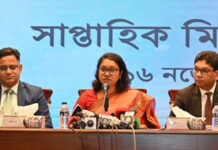
The state-run Bangladesh Television (BTV) is a prime example of how a thriving institution can be taken to the brink of destruction through the government’s weak policies, faulty appointment systems and undeserving promotions. Even just a decade ago, in the 2003-04 fiscal, BTV was making an annual profit of Tk 520 million taka, and now its is submerged in losses of nearly Tk 300 million.
BTV is losing revenue as well as viewers. No one watches BTV now unless compelled to do so. It is nothing but a publicity box for the ruling party’s leaders and supporters.
Information minister Hasanul Huq Inu tells Prothom Alo, the negligence of various governments from the eighties onwards has reduced this strong and popular institution to today’s pitiful condition. He says that the people’s annoyance and criticism regarding BTV news and its programme quality is justified.
According to a survey run by MRB Bangladesh (previously Sirius Marketing and Social Research), BTV has very few viewers in Dhaka. TV viewers in Dhaka city watch local TV channels 25% to 30% of the time. During any sports or other special event, this increases to 50%. The remaining viewing time is spent watching foreign channels.
Samir Paul, MRB’s group business director, says according to the survey, 70.24% of the time that Dhaka’s viewers watch TV, they focus on foreign channels. The remaining time, almost 35%, they watch local channels. And only 1.2% of those watching local channels turn to BTV. In 2010 this was 2.46%.
During the political unrest of 2013, the number of viewers of most of the private channels increased. The previous year viewers would give 2.11% of their time to BTV. But as BTV did not give accurate coverage of the political situation in 2013, this plummeted to 1.3%.
BTV is to celebrate its 50th anniversary (1964-2014) on 25 December. Cultural personality Ramendu Majumdar tells Prothom Alo, “Celebrating is not enough, there must be qualitative change in the broadcast media and that must be manifest on screen.” He says that the harsh reality of today is that if there is the scope to watch any other channel, no one watches BTV.
BTV’s Director General Abdul Mannan does not agree that the channel’s viewers have decreased. He tells Prothom Alo that BTV is surging ahead in keeping with the times, upholding the dreams, aspirations and expectations of the 160 million people of the country.
Spree of promotions, no appointments: Direct appointments to BTV have stopped for around six years now. In keeping with the appointment policy created by the officers and employees of BTV, mass promotions are given instead of fresh appointments. Now there is a dire lack of educated and qualified officers. The list 169 senior officers published on 30 May 2010 show that back then there were 15 first class officers who had not been able to pass their Bachelor’s degree.
There are 1667 approved posts in BTV, including the two stations at Dhaka and Chittagong, 14 substations and the head office at Rampura. Of these, 404 posts are vacant, and 152 are first class officers. Direct appointments have been stopped since 2009.
The information minister says efforts are on to appointment personnel within the next three to four months. This will make up for the deficit of 150 first class officers.
Several officers of the ministry and BTV say that because the information minister is a JSD leader, leaders and staunch supporters of the ruling party obstruct any move he takes to bring about changes in BTV.
Iqbal Sobhan Chowdhury, advisor to the prime minister, says, “It is obvious that the information minister is failing to handle BTV. But it is his responsibility to improve the quality of news and programmes at BTV and restore its good standing.”
BTV is the only terrestrial channel of the country and it’s network covers 95% of the country. BTV claims that its viewers in the urban area are relatively less, but it almost has a monopoly in the rural areas because the private channels haven’t reached there as yet.
Revenue drops: Even a decade ago BTV would make an annual profit of Tk 520 million From 2009-10 it began to show losses. That fiscal its income was about Tk 1.32 billion, and expenditure Tk. 1.43 billion. It showed a loss of Tk. 110 million.
Budget allocation for BTV in the 2013-14 fiscal was about Tk 2 billion. Its income was about Tk. 900 million. From the remaining Tk. 1.1 billion, a total of Tk. 800 million was spent on airwaves and other services. BTV’s deficit is around Tk 300 million.
Just a decade ago (2003-04) BTV would earn Tk 830 million from advertisement revenue. While the target for the current fiscal was set at Tk 850 million, it is not likely to be met.
BTV’s director general says that advertisements are now divided up. BTV doesn’t have qualified sales and marketing persons. Also, being a government concern, BTV couldn’t take advertisements outside of the rules.
Bureaucracy in the media: Prothom Alo investigations show that BTV news, administration and finance are mostly run by bureaucracy. Abdul Mannan, additional secretary of the information ministry, has been made director general of a technical institution like BTV. He may be known as a poet, but has no experience in running a media institution.
The deputy director general (programmes) is said to have been politically appointed and is the “big boss” of BTV. He has no experience in mainstream journalism, yet he also served for some time as BTV’s deputy director (news).
BTV’s popularity drops, what about the government’s popularity? A certain producer of BTV has said that all the government use BTV to increase their popularity. But it is unclear as to whether the government’s actually benefit from this.
Iqbal Sobhan Chowdhury says when the private channels broadcast BTV news, the viewers just switch to a different channel. Ramendu Majumdar says that BTV has to give up the habit of always putting the president and prime minister’s news first.
Media personality Muhammed Jahangir says BTV could survive the competition if it just kept the news and one talk show in its own control and maintained a good standard and neutrality for the remaining programmes.
Source: Prothom Alo









